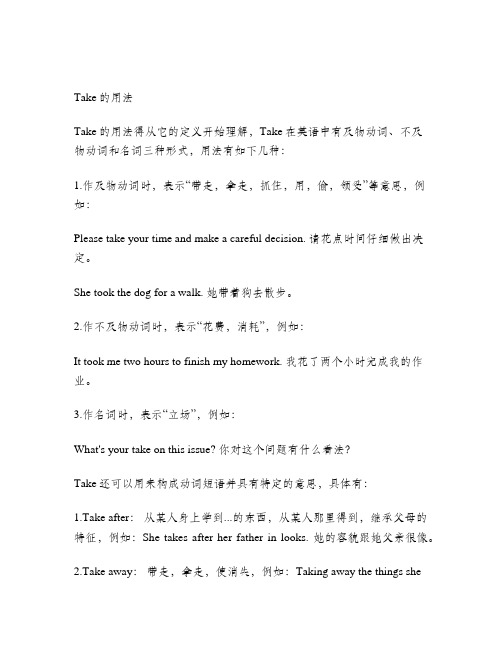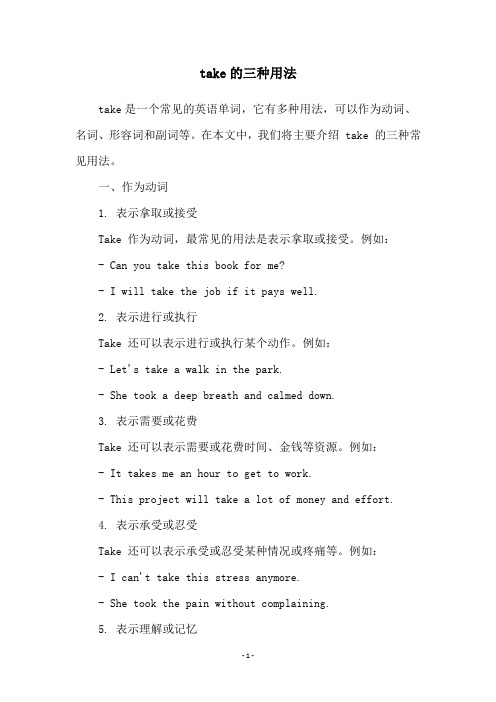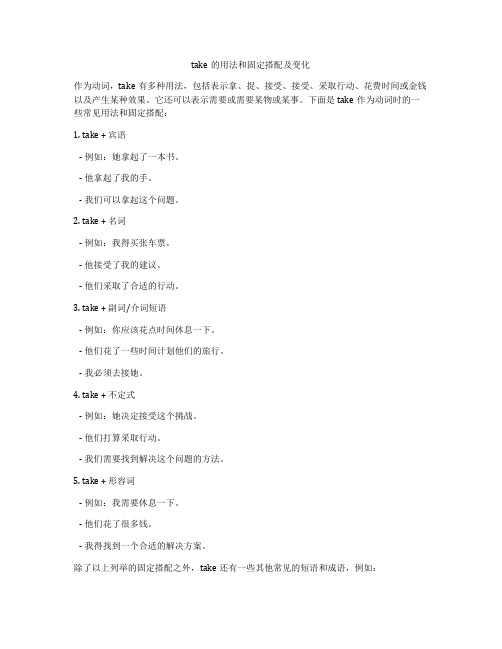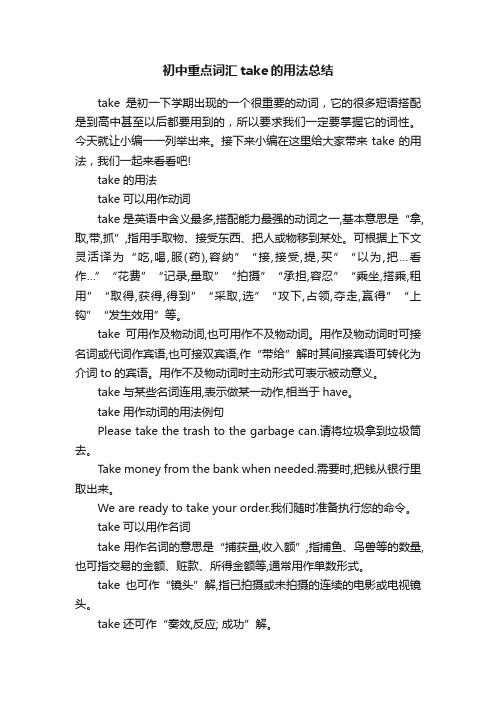take的详细用法~
take的用法及短语和搭配

take的用法及短语和搭配一级标题:Take的用法及短语和搭配引言:在英语中,动词“take”是非常常用且多样化的一个动词。
它可以表示许多不同的意思和概念,并且在日常生活和商务场合中都得到广泛应用。
本文将详细介绍“take”的用法,以及相关短语和搭配。
二级标题 1:表示行为或动作1. Take a walk/hike: 散步/远足例如:- Let's take a walk in the park and enjoy the fresh air.- We decided to take a hike up the mountain for some adventure.2. Take a seat: 就座例如:- Excuse me, may I take this seat?- Please find a place to take a seat and wait for your turn.3. Take a break/rest: 休息例如:- After working for hours, it's important to take a break and recharge.- The doctor advised him to take more rests to recover from exhaustion.4. Take a shower/bath: 洗澡/洗澡盆例如:- I usually take a shower in the morning to start my day fresh.- It's relaxing to take a warm bath after a long day of work.二级标题 2:表达拿取、获取或接收1. Take notes: 记笔记例如:- During the lecture, make sure to take notes of the key points.- Students are encouraged to bring notebooks and pens to take notes. 2. Take a photo/picture: 拍照例如:- Let's take a photo to capture this beautiful moment.- The photographer asked them to stand still while he took their picture.3. Take a taxi/cab: 打出租车例如:- I'm running late for the meeting, so I'll take a taxi instead of walking. - It's raining heavily, let's take a cab to avoid getting wet.4. Take an exam/test: 参加考试例如:- Tomorrow I have to take an important English exam.- She spent weeks preparing before taking the driving test.二级标题 3:表示接受、承担或采取措施1. Take responsibility: 承担责任例如:- As the team leader, it's important to take responsibility for any mistakes made.- He admitted his fault and was willing to take full responsibility for the consequences.2. Take action/steps: 采取行动/步骤例如:- It's time to take action and address this issue immediately.- To achieve success, you need to take consistent and strategic steps towards your goals.3. Take precautions/measures: 采取预防措施例如:- In order to prevent accidents, always remember to take necessary safety precautions.- The company has taken measures to protect its employees from potential risks.4. Take advice/suggestion: 接受建议/意见例如:- He should have taken my advice and avoided this mistake.- The CEO always encourages employees to take suggestions for improvement into consideration.二级标题 4:表示消费或较长时间的过程1. Take a vacation/trip: 度假/旅行例如:- After months of hard work, it's time to take a vacation and relax.- They planned to take a trip around Europe during the summer break.2. Take a loan/borrow: 借款/借例如:- To start his own business, he had to take a loan from the bank.- Can I borrow some money from you? I'll pay you back next week.3. Take time: 花费时间例如:- Learning to play an instrument takes time and dedication.- Rome wasn't built in a day; building a successful career also takes time.4. Take advantage of: 利用例如:- We should take advantage of the discount and buy those items now.- She always knows how to take advantage of any opportunity that comes her way.总结:以上是关于"take"的常见用法及相关短语和搭配的详细介绍。
Take的用法

Take的用法Take的用法得从它的定义开始理解,Take在英语中有及物动词、不及物动词和名词三种形式,用法有如下几种:1.作及物动词时,表示“带走,拿走,抓住,用,偷,领受”等意思,例如:Please take your time and make a careful decision. 请花点时间仔细做出决定。
She took the dog for a walk. 她带着狗去散步。
2.作不及物动词时,表示“花费,消耗”,例如:It took me two hours to finish my homework. 我花了两个小时完成我的作业。
3.作名词时,表示“立场”,例如:What's your take on this issue? 你对这个问题有什么看法?Take还可以用来构成动词短语并具有特定的意思,具体有:1.Take after:从某人身上学到...的东西,从某人那里得到,继承父母的特征,例如:She takes after her father in looks. 她的容貌跟她父亲很像。
2.Take away:带走,拿走,使消失,例如:Taking away the things shehad collected, he left the room. 他把她收集的东西都拿走,然后离开了房间。
3.Take back:退货,收回说话,撤回 (承认错误),例如:He took back his promise. 他收回了他的承诺。
4.Take away:减去,使失去,例如:The cold weather takes away his appetite. 寒冷的天气给他带来了食欲不振。
5.Take down:写下,击倒,拆毁,例如: She took down the notes during the lecture. 在讲座期间,她把笔记记下来了。
6.Take in:接纳,收留,吸收,理解,缩短,例如:Take in my words,don't forget them. 把我的话记在心里,别忘了。
take的用法总结大全

take的用法总结大全想了解take的用法么?今天给大家带来了take的用法,希望能够帮助到大家,下面就和大家分享,来欣赏一下吧。
take的用法take的意思vt. 拿,取,采取,接受(礼物等),耗费(时间等)vi. 拿,获得n. 镜头,看法,收入额,场景变形:过去式: took; 现在分词:taking; 过去分词:taken;take用法take可以用作动词take是英语中含义最多,搭配能力最强的动词之一,基本意思是“拿,取,带,抓”,指用手取物、接受东西、把人或物移到某处。
可根据上下文灵活译为“吃,喝,服(药),容纳”“接,接受,提,买”“以为,把…看作…”“花费”“记录,量取”“拍摄”“承担,容忍”“乘坐,搭乘,租用”“取得,获得,得到”“采取,选”“攻下,占领,夺走,赢得”“上钩”“发生效用”等。
take可用作及物动词,也可用作不及物动词。
用作及物动词时可接名词或代词作宾语,也可接双宾语,作“带给”解时其间接宾语可转化为介词to的宾语。
用作不及物动词时主动形式可表示被动意义。
take与某些名词连用,表示做某一动作,相当于have。
take用作动词的用法例句Please take the trash to the garbage can.请将垃圾拿到垃圾筒去。
Take money from the bank when needed.需要时,把钱从银行里取出来。
We are ready to take your order.我们随时准备执行您的命令。
take可以用作名词take用作名词的意思是“捕获量,收入额”,指捕鱼、鸟兽等的数量,也可指交易的金额、赃款、所得金额等,通常用作单数形式。
take也可作“镜头”解,指已拍摄或未拍摄的连续的电影或电视镜头。
take还可作“奏效,反应; 成功”解。
take用作名词的用法例句Love includes gives and takes.爱情包含着给予和索取。
take的详细用法

takeMEANINGS 义项1.MOVE 移动[T] to move or go with someone or something from one place to another带(走);拿(走);取(走);搬(走)•Would you mind taking Susie home ? 请你带苏茜回家好吗?•When he refused to give his name, he was taken into custody. 他拒绝说出自己的名字,于是就被拘留了。
•My job has taken me all over the world. 我的工作让我走遍了世界各地。
take sb/sth to/into etc sth•Barney took us to the airport. 巴尼把我们送到机场。
take sb/sth with you•His wife went to Australia, taking the children with her. 他的妻子带着孩子去了澳大利亚。
take sb sth•I have to take Steve the money tonight. 我今晚得把钱带给史蒂夫。
take sb to do sth•He took me to meet his parents. 他带我去见他的父母。
2.ACTION 行动[T] used with a noun instead of using a verb to describe an action. For example, if you take a walk, you walk somewhere.做〔某个动作;和名词连用代替某个动词〕•Would you like to take a look? 你想看看吗?•Mike’s just taking a shower. 迈克正在淋浴。
•Sara took a deep breath. 萨拉深深地吸了一口气。
take用法

take用法Take用法Take是一个常见的动词,意为“拿”、“取”、“接受”等。
在日常生活和工作中,我们经常使用take这个词汇。
本文将从不同的角度介绍take的用法。
一、基本用法1. take sb./sth. + 名词/代词:表示“拿某人/某物”。
例如:- He took the book from the shelf.(他从书架上拿了那本书。
)- Can you take me to the airport?(你能送我去机场吗?)2. take + 方向副词/介词短语:表示“朝某个方向走”。
例如:- Take a left at the next intersection.(在下一个十字路口向左拐。
)- Take the stairs to the second floor.(走楼梯到二楼。
)3. take + 时间段:表示“花费时间”。
例如:- It took me two hours to finish my homework.(我花了两个小时完成作业。
)- How long does it take to get to London by train?(坐火车到伦敦需要多长时间?)4. take + 动名词:表示“进行某项活动”。
例如:- I want to take swimming lessons this summer.(今年夏天我想学游泳。
)- Let's take a break and have some coffee.(让我们休息一下,喝杯咖啡吧。
)二、习语用法1. take it easy:意为“不要着急,放松一下”。
例如:- You've been working too hard. Take it easy for a while.(你工作太辛苦了,休息一下吧。
)2. take care of:意为“照顾,照料”。
例如:- Can you take care of my cat while I'm on vacation?(我度假期间你能照顾我的猫吗?)3. take advantage of:意为“利用”。
take的用法

take的用法take是一个很常见的英语单词,可用作名词、及物动词和不及物动词。
名词take用作名词的意思是“捕获量,收入额”,指捕鱼、鸟兽等的数量,也可指交易的金额、赃款、所得金额等,通常用作单数形式。
take也可作“镜头”解,指已拍摄或未拍摄的连续的电影或电视镜头。
take还可作“奏效,反应;成功”解。
take在俚语中也可作“尝试,努力”解。
及物动词take用及物动词时意为“拿,取;采取;接受(礼物等);买,花费;耗费(时间等)”。
用作及物动词时,可接名词或代词作宾语,也可接双宾语;作“带给”时,其间接宾语可转化为介词to的宾语。
例如:Shall we take them to the cinema? 我们要带他们去电影院吗?解析“take sb. to ...”意为“把某人带去……”,其中to为介词,后面可直接跟地点名词。
但若接地点副词(here,there,home等)时,要省略介词to。
如: I want to take my little sister to the zoo on Saturday.星期六我想带我的小妹妹去动物园。
Can you take me there? 你能带我去那里吗?另外:“take sth. to ...”表示“把某物带给……”,后面可直接跟人,即take sth. to sb.,意为“把某物带给某人”。
如: Let's take the food to my grandparents. 咱们把这些食物带给我的祖父母吧。
不及物动词take用作不及物动词时意为“拿;获得”。
用作不及物动词时,主动形式可表示被动意义。
拓展Take的短语1.take some 不大容易2.take care of oneself 照顾自己;颐养3.take part 参与,参加4.take part in 参加,参与5.take on 承担;呈现;具有;流行;接纳;雇用;穿上6.take up 拿起;开始从事7.take effect 生效;起作用8.take off 起飞;脱下;离开9.take a look 看一下10.take out 取出;去掉;出发;抵充11.take into 考虑到;说服12.take in 接受;理解;拘留;欺骗;让…进入;改短13.take seriously 重视;认真对待…14.take away 带走,拿走,取走15.take a look at [口]看一看;检查16.take over 接管;接收17.take for granted 认为…理所当然18.take the lead 带头;为首19.take charge of 接管,负责20.take good care 好好照顾;珍重21.take place 举行进行产生22.Take Me Out 执子之手,带我走吧,我们约会吧23.take care 小心当心注意照顾好自己24.take turns 轮流依次替换轮流换班25.take notes 做笔记做记录作笔记take的形式复数takes 第三人称单数takes 现在分词taking 过去式took 过去分词taken。
take短语用法完全归纳.

take短语用法完全归纳take back收回,接回,退回take down 写下,记下;拆下,拆掉(The machine takes down easily. 这机器很容易拆。
)take in收留;包括(The list takes in everyone. 每个人都上了名单。
);理解(We find it difficult to take in what he teaches. 我们发现他教的东西很难理解。
);欺骗,使上当(Don’t be taken in by his promises. 别被他的诺言所欺骗。
)take off脱下;起飞;打折扣,扣掉,去掉(Can you take five dollars off the price? 你可以减价五美元吗?);请假,休息(I want to take a day off (from work). 我想休假一天。
)take on聘用,雇用(The company decided to take on a new secretary. 这家公司决定聘一个新秘书。
);呈现,显现,具有(This word had taken a new meaning. 这个词有了新的意义。
)承担或担任(工作或责任等)(He advised me not to take too much work. 他劝我不要做太多的工作。
)take over接替,接管,继承(Who will take over his job? 他的工作由谁来接替? )take to 喜欢;养成习惯,沉溺于;去(某处)take up开始(学习或从事等)(For a long time I had wanted to take up writing. 很久以来我一直想从事写作。
);继续(This chapter takes up where the last one left off. 本章接续上一章谈到的内容。
take的三种用法

take的三种用法take是一个常见的英语单词,它有多种用法,可以作为动词、名词、形容词和副词等。
在本文中,我们将主要介绍 take 的三种常见用法。
一、作为动词1. 表示拿取或接受Take 作为动词,最常见的用法是表示拿取或接受。
例如:- Can you take this book for me?- I will take the job if it pays well.2. 表示进行或执行Take 还可以表示进行或执行某个动作。
例如:- Let's take a walk in the park.- She took a deep breath and calmed down.3. 表示需要或花费Take 还可以表示需要或花费时间、金钱等资源。
例如:- It takes me an hour to get to work.- This project will take a lot of money and effort.4. 表示承受或忍受Take 还可以表示承受或忍受某种情况或疼痛等。
例如:- I can't take this stress anymore.- She took the pain without complaining.5. 表示理解或记忆Take 还可以表示理解或记忆某个事实或信息。
例如:- It took me a while to understand the instructions.- I can't take all these numbers in my head.二、作为名词1. 表示时间Take 作为名词,最常见的用法是表示时间。
例如:- It's going to take a long time to finish this project. - The flight takes about six hours.2. 表示机会或机会成本Take 还可以表示机会或机会成本。
take 用法

take 用法
take 的最常用用法是“拿”,即把事物从一个地方再带到另一个地方,也可以指把
某物从其所属者那里拿开或拿去。
例如:
He took the book from the shelf. 他把书从架子上拿走了。
take 还可表示“吃药”、“参加”以及“需要”等意思,如:
Take two tablets every morning. 每天早上吃两片药片。
She took part in the discussion. 她参加了讨论。
It will take some time to finish the work. 这项工作需要一些时间才能完成。
take 后跟名词、代词、动词不定式作宾语时“拿”的意思不一样,它表示“拿去
(带走)”的意思,有时也可以表示“带给或给于”的意思,如:
Take your shoes off. 把你的鞋子脱掉。
Please take me to the bus station. 请带我去汽车站。
Will you take your coat with you? 你把外衣带走吗?
另外,take 还有“取得”,“经历”,“耗费”,“花费”,“认为”,“采取”,“接受”等多种用法:
The police are going to take the necessary action. 警察们正准备采取必要的
行动。
She took my advice and accepted the offer. 她接受了我的建议并接受了这个提议。
take的用法和固定搭配及变化

take的用法和固定搭配及变化作为动词,take有多种用法,包括表示拿、捉、接受、接受、采取行动、花费时间或金钱以及产生某种效果。
它还可以表示需要或需要某物或某事。
下面是take作为动词时的一些常见用法和固定搭配:1. take + 宾语- 例如:她拿起了一本书。
- 他拿起了我的手。
- 我们可以拿起这个问题。
2. take + 名词- 例如:我得买张车票。
- 他接受了我的建议。
- 他们采取了合适的行动。
3. take + 副词/介词短语- 例如:你应该花点时间休息一下。
- 他们花了一些时间计划他们的旅行。
- 我必须去接她。
4. take + 不定式- 例如:她决定接受这个挑战。
- 他们打算采取行动。
- 我们需要找到解决这个问题的方法。
5. take + 形容词- 例如:我需要休息一下。
- 他们花了很多钱。
- 我得找到一个合适的解决方案。
除了以上列举的固定搭配之外,take还有一些其他常见的短语和成语,例如:- take care of:照顾,处理例如:我得照顾我妈妈。
- take a break:休息一下,放松一下例如:他们决定休息一下。
- take advantage of:利用例如:我们得利用这个机会。
- take into account:考虑,顾及例如:我们必须考虑这个问题。
- take it easy:放松,别紧张例如:别紧张,慢慢来。
此外,take还可以用来构成许多短语动词,例如take off, take on, take up等等,这些短语动词的意思通常与take的基本意思有所不同,需要根据具体语境来理解和应用。
另外,take在口语中还有一些不太常见的用法,例如take it or leave it意思是要么接受,要么离开,take the plunge意思是决定做某件重要或困难的事情,take the cake意思是是最好、最聪明、最有意思的人或事。
在过去式和过去分词形式下,take的变化形式为took(过去式)和taken(过去分词),例如:- 他昨天把书拿走了。
take用法

take用法take after1.仿效:将…作为榜样跟随2.相象:在相貌、脾气或性格上相似take apart1.拆开:分开后将…分成许多部分2.详细分析研究:肢解或分析(如,一个理论),通常是籍此以发现隐藏的或固有的弊端或缺点3.【俚语】狠揍;把…打扁take back1.收回(所说的或所写的事)She finally took back her words. 她最终收回了自己的话。
take down1.拿下,放下:将…从一个较高的位置拿到一个较低的位置2.拆开;拆散Take down the Christmas tree.把圣诞树拆散3.挫…的锐气:压低(一个人的)傲慢或自尊Really took him down during the debate.在辩论中实实在在地煞了他的威风4.记下:以书写的形式记录下来的take for1.把…视作Do you take me for a fool?你以为我是个傻瓜吗?2.误认为Don't take silence for approval.不要把沉默误认为是同意take in1.让…进入,接纳,吸收:允许…进来;接受…为客人或雇员2.收缩:在尺寸上减小;使…变小或为变短Took in the waist on the pair of pants.把裤子的腰身改小一些3.包括,构成4.理解Couldn't take in the meaning of the word.不能够理解这个词的含义5.欺骗,诱骗Was taken in by a confidence artist.被一名骗人的行家给骗了6.详尽地看;注视Took in the sights.饱览各个景色7.接(活计)在家里做:为获取报酬而接下(在自己家里完成的工作)Took in typing.在家的打字活8.押送(罪犯)去警察局take off1.脱掉(衣服等)Take one's coat off; take off one's galoshes.脱去外衣;脱下套靴2.放开Took the brake off.松开刹车3.打折:作为折扣而减价Took 20 percent off.优惠百分之二十4.带走5.广泛使用,大受欢迎Took off in a hurry.匆匆地离去A new movie that really took off.一部极为卖座的新片6.起飞The plane took off on time.飞机准时起飞7.取消Took off the commuter special.取消了特殊通勤8.休假:暂时不做(自己工作中的)应做的工作I'm taking off three days during May.五月份我将会休假三天take on1.从事,开始对付Took on extra responsibilities.担负了额外的责任2.雇;雇佣Took on more workers during the harvest.在收获期间雇了更多的工人3.对抗:在竞争中迎击A wrestler who took on all comers.一个接受所有新手挑战的摔跤运动员4.【非正式用语】激动,大惊小怪:表现出猛烈的或激动的情感Don't take on so!别这样大吵大闹!5.摆架子,假装:获得(比如,相貌)作为自己的或使它象是自己的Over the years he has taken on the look of a banker.这些年来他摆出了一副银行家的派头?take out1.取出;弄走Took the splinter out.取出木屑2.向机关申请取得:通过向一个权力机关申请来获得(比如,许可证)3.【非正式用语】陪伴(比如,约会中一方)4.发泄Don't take your frustration out in such an aggressive manner.不要用这样一种积极的方式来发泄你的失意5.获得平衡:作为一种不同形式的对等物取得Took out the money owed in services.平衡各亏欠服务中心的钱6.【非正式用语】开始一段路程;出发The police took out after the thieves.警方出动警力追捕小偷7.在武装攻击或其它类似的方式搜寻并摧毁Two snipers took out an enemy platoon.两名狙击手消灭了敌人一个排Combat pilots, flying low to avoid radar, took out the guerrilla leader's bunker in a single mission.在一次行动中,战斗机飞行员在低空飞行以躲避雷达,发现并炸毁了游击队领导所在的掩体take over1.接管:获得对…的控制或管理take to1.求救于;(如为了安全)前往Took to the woods.躲到树林里2.养成习惯,沉于:有了…的习惯或开始持续地做Take to drink.染上了酗酒的恶习3.喜爱,亲近:喜欢上…或和…变得亲近“Two keen minds that they are, they took to each other”( -- Jack Kerouac)“越敏锐的两颗心,越容易互相吸引”( -- 杰克?凯鲁亚克)take up1.举起;升起2.缩减,改紧:在尺寸上减小;缩短或使…更紧Take up a gown.把一件袍子改短些3.付清一笔(数目可观的债务、抵押贷款或票据)4.接受所提供的(一种选择、一笔赌注或一个挑战)5.再次开始;重新开始Let's take up where we left off.让我们接着我们停下来的地方重新开始6.用尽,耗掉或占用The extra duties took up most of my time.额外工作耗费了我绝大部分时间7.喜欢,钟爱:对…产生了兴趣或钟爱Take up mountain climbing.喜欢上登山运动8.处理Let's take up each problem one at a time.让我们一个问题一个问题地来解决9.摆出Took up a friendly attitude.摆出友好的态度10.吸收,吸附Crops taking up nutrients.正在吸收养分的作物11.开始从事(一项职业或行当)Took up engineering.干起了工程设计这一行be on the take1.(非正式)受贿be taken ill1.突然生病have what it takes1.(非正式)具备成功所需的基本条件take a chair1.坐下take advantage of (或take advice etc.)take something as read1.(英)认为…是理所当然的take the biscuit (或cake)1.(非正式)(人,事情)最出色的;最愚蠢的take five1.(非正式,主北美)休息一下take a lot of (或some)1.难做He might take some convincing.他可能需要费事找一些更令人信服的证据。
take的用法例句

take的用法例句1. 基本用法- “take”作为及物动词,有“拿;取;接受;花费(时间);乘坐(交通工具)”等意思。
例如:I take my book from the table.(我从桌子上拿我的书。
)- 作为不及物动词,有“走;奏效;起作用”等意思。
例如:The medicine doesn't take.(这药不起作用。
)2. 固定搭配- take off- The plane will take off soon.(飞机很快就要起飞了。
)- He took off his hat and bowed to us.(他摘下帽子向我们鞠躬。
)- take on- She takes on a lot of work at the office.(她在办公室承担了很多工作。
)- The city takes on a different look at night.(这个城市在夜晚呈现出不同的面貌。
)- take up- I'm going to take up painting this year.(我打算今年开始学画画。
)- This table takes up too much space.(这张桌子占太多空间了。
)- take in- The hotel can take in 200 guests.(这家旅馆能容纳200位客人。
)- Don't be taken in by his lies.(不要被他的谎言所欺骗。
)- take out- Let's take out some pizza for dinner.(咱们叫些披萨当晚餐吧。
)- He took out his wallet to pay.(他拿出钱包来付钱。
)3. 更多双语例句- I take it that you don't like my idea. Well, isn't that a pity?(我认为你不喜欢我的主意。
take的用法搭配

take的用法搭配“Take”常见用法如下:- 作动词时,基本含义有“拿;取;携带;接受;花费;乘坐;拍摄;采取;认为”等。
固定搭配:- take a walk:散步- take a photo:拍照- take a shower:洗澡- take medicine:吃药- take a seat:就座- take care of:照顾- take part in:参加- take it easy:别紧张- take off:起飞;脱掉- take on:承担;呈现双语例句:1. I'm going to take a walk in the park. It's like a journey to find peace among the trees. (我要去公园散步。
就像是在树林间寻找宁静的旅程。
)2. “Hey, take a photo of me with this beautiful flower!” she said to her friend. “Sure, you'll look amazing!” her friend replied. (“嘿,给我和这朵漂亮的花拍张照!”她对朋友说。
“当然,你会看起来很棒!”朋友回答。
)3. After a long day, I can't wait to take a shower and wash away all the tiredness. It's like a refreshing rain for my body. (漫长的一天后,我迫不及待地想洗澡,洗去所有的疲惫。
就像是给身体来一场清爽的雨。
)4. “You have to take your medicine on time, or you won't get well soon.” Mom told me. I sighed, “Okay, I know. I don't want to be sick forever.” (“你得按时吃药,不然不会很快好起来。
take的用法及句型

take的用法及句型1. "take"作为及物动词,常用于以下几种句型:- take +名词:表示从某处取得或携带某物。
例如:He took his coat from the hanger.(他从衣架上拿下他的外套。
)- take +某物+从某处:表示某人从某处携带某物离开。
例如:She took her bag from the locker and left the gym.(她从储物柜里拿出她的包离开了健身房。
)- take +时间:表示花费时间。
例如:It took me three hoursto finish the homework.(我花了三个小时才完成作业。
)- take +动作+ to do:表示某人做某事花费的时间。
例如:It took us a long time to decide where to go for vacation.(我们花了很长时间才决定去哪里度假。
)2. "take"还可用于以下一些常见表达:- take a rest/break:休息一下。
例如:Let's take a break after working for three hours.(工作三个小时后我们休息一下。
)- take a shower/bath:洗澡。
例如:I usually take a shower before going to bed.(我通常在睡觉前洗个澡。
)- take someone's advice:接受某人的建议。
例如:I should have taken my friend's advice and not invested in that company.(我当时应该听取我朋友的建议,不该投资那家公司。
)3. "take"还有其他一些特殊用法,包括:- take after:与某人相像,继承某人的特征。
take的用法总结大全

take的用法总结大全想了解take的用法么?今天给大家带来了take的用法,希望能够帮助到大家,下面就和大家分享,来欣赏一下吧。
take的用法take的意思vt. 拿,取,采取,接受(礼物等),耗费(时间等)vi. 拿,获得n. 镜头,看法,收入额,场景变形:过去式: took; 现在分词:taking; 过去分词:taken;take用法take可以用作动词take是英语中含义最多,搭配能力最强的动词之一,基本意思是“拿,取,带,抓”,指用手取物、接受东西、把人或物移到某处。
可根据上下文灵活译为“吃,喝,服(药),容纳”“接,接受,提,买”“以为,把…看作…”“花费”“记录,量取”“拍摄”“承担,容忍”“乘坐,搭乘,租用”“取得,获得,得到”“采取,选”“攻下,占领,夺走,赢得”“上钩”“发生效用”等。
take可用作及物动词,也可用作不及物动词。
用作及物动词时可接名词或代词作宾语,也可接双宾语,作“带给”解时其间接宾语可转化为介词to的宾语。
用作不及物动词时主动形式可表示被动意义。
take与某些名词连用,表示做某一动作,相当于have。
take用作动词的用法例句Please take the trash to the garbage can.请将垃圾拿到垃圾筒去。
Take money from the bank when needed.需要时,把钱从银行里取出来。
We are ready to take your order.我们随时准备执行您的命令。
take可以用作名词take用作名词的意思是“捕获量,收入额”,指捕鱼、鸟兽等的数量,也可指交易的金额、赃款、所得金额等,通常用作单数形式。
take也可作“镜头”解,指已拍摄或未拍摄的连续的电影或电视镜头。
take还可作“奏效,反应; 成功”解。
take用作名词的用法例句Love includes gives and takes.爱情包含着给予和索取。
初中重点词汇take的用法总结

初中重点词汇take的用法总结take是初一下学期出现的一个很重要的动词,它的很多短语搭配是到高中甚至以后都要用到的,所以要求我们一定要掌握它的词性。
今天就让小编一一列举出来。
接下来小编在这里给大家带来take的用法,我们一起来看看吧!take的用法take可以用作动词take是英语中含义最多,搭配能力最强的动词之一,基本意思是“拿,取,带,抓”,指用手取物、接受东西、把人或物移到某处。
可根据上下文灵活译为“吃,喝,服(药),容纳”“接,接受,提,买”“以为,把…看作…”“花费”“记录,量取”“拍摄”“承担,容忍”“乘坐,搭乘,租用”“取得,获得,得到”“采取,选”“攻下,占领,夺走,赢得”“上钩”“发生效用”等。
take可用作及物动词,也可用作不及物动词。
用作及物动词时可接名词或代词作宾语,也可接双宾语,作“带给”解时其间接宾语可转化为介词to的宾语。
用作不及物动词时主动形式可表示被动意义。
take与某些名词连用,表示做某一动作,相当于have。
take用作动词的用法例句Please take the trash to the garbage can.请将垃圾拿到垃圾筒去。
Take money from the bank when needed.需要时,把钱从银行里取出来。
We are ready to take your order.我们随时准备执行您的命令。
take可以用作名词take用作名词的意思是“捕获量,收入额”,指捕鱼、鸟兽等的数量,也可指交易的金额、赃款、所得金额等,通常用作单数形式。
take也可作“镜头”解,指已拍摄或未拍摄的连续的电影或电视镜头。
take还可作“奏效,反应; 成功”解。
take用作名词的用法例句Love includes gives and takes.爱情包含着给予和索取。
The lioness brought her take to her baby.母狮子把捕获的猎物叼给了狮宝宝。
- 1、下载文档前请自行甄别文档内容的完整性,平台不提供额外的编辑、内容补充、找答案等附加服务。
- 2、"仅部分预览"的文档,不可在线预览部分如存在完整性等问题,可反馈申请退款(可完整预览的文档不适用该条件!)。
- 3、如文档侵犯您的权益,请联系客服反馈,我们会尽快为您处理(人工客服工作时间:9:00-18:30)。
takeMEANINGS 义项1.MOVE 移动[T] to move or go with someone or something from one place to another带(走);拿(走);取(走);搬(走)•Would you mind taking Susie home ? 请你带苏茜回家好吗?•When he refused to give his name, he was taken into custody. 他拒绝说出自己的名字,于是就被拘留了。
•My job has taken me all over the world. 我的工作让我走遍了世界各地。
take sb/sth to/into etc sth•Barney took us to the airport. 巴尼把我们送到机场。
take sb/sth with you•His wife went to Australia, taking the children with her. 他的妻子带着孩子去了澳大利亚。
take sb sth•I have to take St eve the money tonight. 我今晚得把钱带给史蒂夫。
take sb to do sth•He took me to meet his parents. 他带我去见他的父母。
2.ACTION 行动[T] used with a noun instead of using a verb to describe an action. For example, if you take a walk, you walk somewhere.做〔某个动作;和名词连用代替某个动词〕•Would you like to take a look? 你想看看吗?•Mike’s just taking a shower. 迈克正在淋浴。
•Sara took a deep breath. 萨拉深深地吸了一口气。
•I waved, but he didn’t take any notice (= pretended not to notice ) . 我挥挥手,但他没有理会我。
•Please take a seat (= sit down ) . 请坐。
take a picture/photograph/photo•Would you mind taking a photo of us together? 你帮我们拍张合影好吗?3.REMOVE 拿开[T] to remove something from a place拿开,把…移开THESAURUSSTEAL→ take away•Police say money and jewellery were taken in the raid. 警方说钱和珠宝都在这次抢劫中被抢走了。
take sth off/from etc sth•Take your feet off the seats. 把你的脚从座位上挪开。
•Someone’s taken a pen from my desk. 有人从我的书桌上拿走了一支钢笔。
4.TIME/MONEY/EFFORT ETC 时间/钱/努力等[I,T] if something takes a particular amount of time, money, effort etc, that amount of time etc isneeded for it to happen or succeed花费〔时间、金钱或努力等〕•How long is this going to take ? 这要花多长时间?•Organizing a successful street party takes a lot of energy. 成功举办一次街头聚会要花费很多精力。
•It took a few minutes for his eyes to adjust to the dark. 过了几分钟他的眼睛才适应了黑暗。
take (sb) sth (to do sth)•Repairs take time to carry out. 修理要花时间。
take (sb) ages/forever•It took me ages to find a present for Dad. 我花了很长时间才买到一样给爸爸的礼物。
take some doing (=need a lot of time or effort)需要花费大量时间[努力]•Catching up four goals will take some doing. 追上四分是要花大力气的。
take courage/guts It takes•courage to admit you are wrong. 承认错误需要勇气。
have what it takes (=to have the qualities that are needed for success)有所需的素质[天赋]•Neil’s got what it takes to be a great footballer. 内尔具备成为一名伟大足球运动员的潜质。
5.ACCEPT 接受[T] to accept or choose something that is offered, suggested, or given to you接受〔某人给的东西、提议等〕•Will you take the job? 你接受这份工作吗?•Do you take America n Express? 你们接受美国运通信用卡吗?•If you take my advice , you’ll see a doctor. 如果你听我的意见,就去看医生。
•Our helpline take s 3.5 million calls (= telephone calls ) a year. 我们的求助热线每年接听350万个电话。
•Some doctors are unwilling to take new patients without a referral. 有些医生不愿意接收没有转诊单的新病人。
•Liz found his criticisms hard to take . 利兹觉得他的批评很难接受。
•I just can’t take any more (= can’t deal with a bad situation any longer ) . 我再也受不了了。
•Staff have agreed to take a 2% pay cut. 员工同意接受2%的降薪。
take a hammering/beating (=be forced to accept defeat or a bad situation)遭到失败/重挫•Small businesses took a hammering in the last recession. 在上次的经济衰退中,小企业遭遇了困境。
I take your point/point taken (=used to say that you accept someone’s opinion)我接受你的观点take sb’s word for it/take it from sb (=accept that what someone says is true)相信某人所说的话•That’s the truth - take it from me. 这是事实——相信我。
take the credit/blame/responsibility•He’s the kind of man who makes things happen but lets others take the credit. 他是那种自己做事却让别人领功的人。
take it as read/given (=assume that something is correct or certain, because you are sure that this is the case)相信某事属实•It isn’t official yet, but you can take it as read that you’ve got the contract. 这虽然还是非正式的,但你可以认为你已经得到这份合同了。
6.HOLD STH 拿着某物[T] to get hold of something in your hands拿着•Let me take your coat. 我来帮你拿着外套吧。
•Can you take this package while I get my wallet? 你帮我拿一下这个包裹好吗?我把钱包拿出来。
take sb/sth in/by sth•I just wanted to take him in my arms. 我好想把他拥在我的怀里。
7.TRAVEL 旅行[T] to use a particular form of transport or a particular road in order to go somewhere乘坐〔某种交通工具〕,走〔某条道路〕•Let’s take a cab. 我们坐出租车吧。
•I took the first plane out. 我搭乘第一班飞机走了。
•Take the M6 to Junction 19. 走6号高速公路到第19号交叉口。
8.STUDY 学习[T] to study a particular subject in school or college for an examination攻读,研修〔某一课程〕THESAURUSSTUDY•Are you taking French next year? 你明年修法语吗?9.TEST 测试[T] to do an examination or test参加〔考试或测验〕SYN SIT BrE 【英】•Applicants are asked to take a written test. 申请者被要求参加一个笔试。
10.SUITABLE 合适的[T not in progressive or passive,不用进行式或被动态] to be the correct or suitable size, type etc for a particular person or thing接纳,容纳;使用,穿用•a car that takes low sulphur fuel 使用低硫燃油的汽车•What size shoe do you take? 你穿多大尺码的鞋子?•The elevator takes a maximum of 32 people. 这电梯最多可以乘32人。
